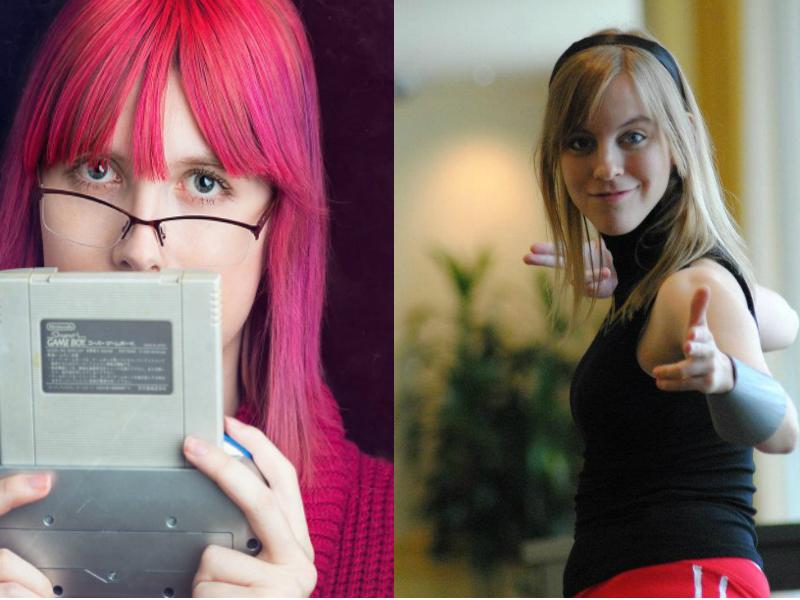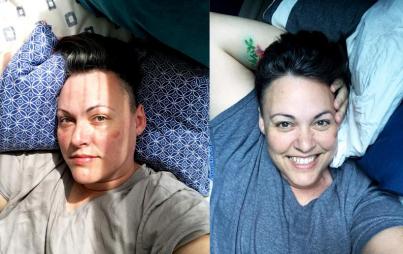
This story starts in media res. I did not know Maddy Myers and Christine Love before I began my interview series. I knew of them—I had played Christine’s Don’t Take It Personally Babe, It Just Ain't Your Story and listened to Maddy’s band The Robot Knights on my commute to work—but my adoration for their work and fearless, almost audacious aggrandization of femme empowerment, sulked in secrecy.
I wasn’t entirely sure, but there was a lingering notion that we were supposed to be enemies.
Christine and I had been metamours for a minute. Sometimes, sharing a partner with someone fosters a bond born of respect and appreciation for the ways you each, separately, provide for the one you care about. And sometimes it breeds a jealous, jilted sort of solidarity—in the absence of houses and children, we take on and adopt the grudges of our beloved.
And that loyalty can linger, languishing. I don’t even speak to either of the people “connecting” me to Christine anymore, or remember what she (and Maddy) had done to deserve my peripheral ire, but uninterrogated lines of code, telling me to shy away, remained interlaced with my operational commands.
When I wrote them to propose a panel interview on femininity in games, following up on my recent interview with Lana Polansky, I expected to incur curt and immediate "no, fuck you, nerd"-s, which I would have totally earned. These were women in my community for whom I had invariably ample opportunity to support and get behind—and instead I had shrunk and took the shortcut out of the room when I saw them because a part of me worried that the now-poisoned apple of my eye might have, through their noxious needling of me to share their prejudices, maybe subconsciously programmed me to grow a robot arm and shoot electric nets at everyone in the room if I came within X amount of feet of either of them.
I was a fool once: I let my love for someone convince me to hate, or rather, to believe others would hate me, if I ever tried to befriend them because they were wicked and wayward.
But they weren't. And aren't. Christine and Maddy are both at least 10 times the degree of tenderness you'd imagine women whose job description includes (if coercively) "block hundreds of anonymous men calling me names on twitter" to be.
At some point, as the giggles gave way, Maddy said to me, "Are you trying to be our friend? Because it's working." I muted my mic and let out a little whimper, a tiny self-assertion of my monsterhood in the soundproof sadness booth startup founders use to take calls about seed money.
Sometimes to shine a light you must set a fire. And sometimes: you have to understand it's you who gets burned. I had not always done right by other women in my community. But I want to do better and I'm so grateful to have had this chance to talk with Christine and Maddy—a conversation so long my editors made me split it in two chapters.
I hadn't (tried) in the past but I am now. Because they deserve my love, my support, and respect—and yours, gentle reader—for all they are and all they do.
And because it's really hard to find people in the "indie games" scene who will admit to loving Smash Bros.
Based on your experiences in tech/games, where lies the line dividing “misogyny” from “femmephobia” in how it manifests in these male-dominated, faux-meritocratic spaces?
Maddy Myers: I feel like so much misogyny is rooted in femmephobia that separating them is hard for me to do. I did write something about presenting femme in tech and trying to get away from wearing masculine clothing. I had noticed this femmephobia in myself and realized I was dressing in specific ways because I had seen feminine clothing as representative of weakness, which is something so ingrained in society in general and obviously in the tech industry as well—it's just everywhere. Everything around us is about how femininity is weakness.
So it’s hard to negotiate wanting to dress that way—in my case in ruffles and tutus and that kind of thing. Wearing that kind of clothing to a tech conference or a games conference specifically is an act of rebellion for me, at this point, because it’s so unusual and marking yourself as something different.
As for misogyny though, honestly, even when I wore jeans and t-shirts to tech conferences people still treated me like crap. It’s not like the women who aren’t wearing ruffles to tech conferences are getting worse or better treatment, per se. But honestly what I would try to say to women on this topic is: It’s a sort of respectability politics thing.
If you dress to try to fit in with the guys, with the jeans and t-shirts, people are still not going to take you seriously. At least they didn’t take me seriously.
Christine Love: A lot of the femmephobia you encounter in tech spaces feels like an extension of what I’ve felt in queer spaces. It’s actually mostly self policing, it’s this misogyny you’ll often find in queer spaces where misogyny is justified because it’s not privileging men, it’s privileging masculinity and that “makes it okay.” It’s functionally identical. It just replaces gender essentialism with looking at identities—it still shits on women, on femininity in the exact same way. My experience has not been fundamentally different, except that it’s coming from queer women, who you think would know better.
It’s interesting to me the way that apathy is lionized and prioritized in tech or games—you’re more respected or trusted if you look like shit.
CL: It’s a performative apathy, though. You have to look like a very particular type of slob.
MM: That’s such a great summation—and I think it ties into this putting a boy genius on a pedestal kind of thing. Like, obviously, the genius has to be a boy and he has to look a very specific kind of way—it’s not even just privileging masculinity as we see in other parts of society, it’s privileging an “alt nerd boy” masculinity where he’s very slobbish, he’s very completely devoted to tech, and he doesn’t have time to make his hair look good or work out.
When I tried to fit in, I tried to look kind of slobbish, but neat, and definitely tried to downplay any sexuality that I had so nobody would hit on me—just so I’d be taken seriously. I think that sort of respect is always off-limits to women in cons; no matter how slobby you are as a lady, you’ll always be seen as a lady, you know?
CL: How much work did you put into this performative non-caring about your outfits?
MM: So much work! Like more work than I put in now! You know, where I just picked outfits that I liked and that I already knew look good, because I have different outfits where “I know this skirt will go great with such and such.”
But when I was trying to pick out outfits for conferences, I would be “OK, I really have to think about which t-shirt is gonna fit me in a way that doesn’t look sexy but isn’t too baggy so it doesn’t make me look like a slob but also not like I’m trying to get attention. . ."—it was really, really silly.
Anyone who has any fashion sense is seen as an outsider, no matter how that fashion sense manifests. We’re nerds, right? We’re not supposed to know how to look good. You want to look like you don’t know anything about fashion, that you’re not trying too hard.
Fashion has long-suffered this slant of being a “shallow pursuit” but it exhausts so much brain power in its implementation. Picking clothes that flatter you that also conform to an aesthetic unity and are appropriate to contexts—it’s designing a system, really. Fashion is a system of processes and expressions.
MM: It’s the realm where women can be creative so it’s the most vilified possible form of being creative.
CL: I think what these nerds realize is that it’s such an expenditure of time, and that’s why it’s so disregarded—"oh this is time better spent burying myself into work and crunching." I think this also ties into this sort of cult of always being busy, of always working, that you find in tech masculinity, where you're not supposed to spend time on frivolous stuff, you should always be working—if you’re just throwing on jeans and a t-shirt, that’s more time to work.
This is the market logic behind the nutrient drink Soylent—the logistics of being alive get in the way of work. Sentience is counter to productivity.
MM: Right, but also there is a definition of what is considered frivolous and what isn’t, right? Like, for example, playing games isn’t frivolous, but spending time on your appearance is.
And I think the implication there is that fashion will always be worthless. Which is hilarious because there are a lot of games that are about fashion.
CL: The games community is constantly shitting on the Kim Kardashian game. Like, when we have Final Fantasy games that are all about fashion, they get laughed at.
MM: Except that fashion exists in other games too! Like, in Dark Souls, you can spend hours making sure you get all the right armor pieces—there’s really no functional reason for doing so, it’s just to look cool.
But looking cool is socially acceptable if it has all the trappings of masculinity, but in other kinds of settings it’s not okay. I just think it’s interesting, when those things overlap—how we can condemn fashion in certain contexts.
Team Fortress 2’s economy is fixated on fashion! It’s like if Atlas Shrugged were written by Karl Lagerfeld.
MM: It’s a game entirely of hats!
CL: People will get involved in this entire economy of clothing—so long as it’s digital, so long as you have to murder people in a video to get that fashion. I feel there is a actual, very visible shift in how people started talking about that game once the economy started rolling in. People did start out talking about strategies, on capture the flag maps, and then it just became conversations about collecting hats and outfits. It completely took over the game.
MM: Because that collector mentality took over the fandom. That’s another thing: I would say that it’s socially acceptable for men to become collectors of virtual items, and maybe even physical items, but only like acceptably masculine items—action figures, cards, pins—but as soon as the objects are feminine in any way it becomes ridiculous, right? And the hats, they’re baseball hats—they’re not My Fair Lady, going to the races types of hats, though that would be incredible!
CL: Oh my god, I know right? God can I please play the spy with a giant fascinator?
Have either of you had a lot of experience playing flash paper doll games? They were a thing for a while on sites like Newgrounds—so I’ve read.
MM: Well, not really for me, I don’t know if Christine—
CL: Yes! Yes! But do you remember the way they were particularly marketed? It wasn’t really about fashion—the focus was “oh, you can also undress them”—there was a naked image underneath and that was always the angle. That was the only way you could sell dress-up dolls to 14 year-olds, if you pretend it’s about something else. And there’s no question: that’s not the appeal of these to anyone. If you wanted to see tits, there’s way more efficient ways of doing so. People are playing dress-up dolls to dress up. But you have to pretend it’s about something else.
Can gender expression be implemented through controls? When I was young I played a lot of wrestling games. I would create “male-bodied” characters that had a women moveset—they (really, I, because this is how I was exploring my variance) would move very daintily about the ring, but ultimately the controls, the input were still the same.
MM: This is something Brianna Wu was talking about to me, once, when she was talking about how she designed her game Revolution60. They had a bunch of women playtesters, and they found that women often wanted more time to prepare their counter attack. So, quote unquote, a "feminine" way of playing, especially—and obviously this is all socialized, so bear with me—but a feminine way of playing would be to consider what your move to be and to watch for patterns, pick up on those patterns and respond to them.
In the society we live in, it makes sense that a woman would respond that way, because that is what we are training them to do, all the time. For better or worse. So that’s a “feminine” way to to approach designing a game that is interesting—though I’m not sure how you would translate that to actual controls, but the fact that we would even acknowledge that there are those socialized differences and how we think about games, just because of “gender” existing, is a start, right?
There must be some way—if you had a feminine fighting game, what would that look like? What would the controls to be like? I would love to play something like that—I love fighting games, but a lot of are them based around that sort of “twitch” mentality—you have to take risks, there’s not a lot of pattern recognition, and the movements are very mechanical as opposed to what we could consider feminine: gracefulness or sort of calculated pattern noticing. Now we’re getting into what femininity is.
This makes me think of Peach from Smash Bros. It’s the entire basis of her character, is that she counter attacks, and that she’s always prepared.
MM: And that she has backup, right? This is something that’s happening with Rosalina as well—she has this extra other little star character who follows her around. That’s something we see Peach doing, she’s always pulling out mushrooms and so on—having multiple characters working with you, that’s seen as being feminine. That’s fine with me. The thing with all of this is, these markers of femininity, that’s something we’ve already been trained to see as worthy of mockery. I don’t know if this is something you've heard, I hear people mock Peach all the time.
CL: Whenever there’s a new Smash Bros game, the first thing people do with Peach is they try to look up her skirt. Her skirt is her most powerful weapon! It’s her mobility! It allows her to float around—it’s so important. But of course, even weaponized, the dress is still mocked.
MM: That concept is fantastic. Everything about Peach is the most over-the-top performative femininity with no sexualization attached to it. She’s completely buttoned up, she has almost this Victorian framing to the top of her dress. She’s feminine and in some ways passive but still very dangerous, at least in the scope of Smash Bros, but that is something that should be laughed at, be undermined in some way, by looking up her skirt, by mocking her for being “stupid.”
One of my first assignments of video game journalism was to play Super Strikers online as Peach or Daisy and I would count how many times the other player would disconnect at half-time if I was winning. It was upwards of 80 percent. Peach has, for so long, served as the representative of girlhood in games—"oh, my sister can play Peach.” Misogyny is so internalized that even to be beaten by a fictitious woman is humiliating.
MM: It’s weird how that works though. I hear from people who play as female characters in MMOs [Massively Multiplayer Online], that they are treated more deferentially and receive that condescending respect where you get items for free when they play as female characters. Even if they are a guy and saying they’re a guy, people will still treat them as a pseudo-woman if they’re playing as one in a game—it’s this type of social phenomenon that only games can allow us to document because it doesn’t really happen anywhere else. Just seeing that feminine representation on the screen in a game, even if you know it’s not a woman because a guy is telling you “I am a guy, this is just my female character,” you’re still going to treat them as if they can’t handle themselves around here. We just assume that feminine marker means weakness. Games are weird.
CL: All misogyny comes down to mutual contradiction. It’s certainly not worried about being consistent.
Do you feel that cooperation and friendship in games are feminine, or rather coded to be feminine? We’re harping on Peach because she’s somewhat the patron saint of femininity in games. But she’s often seen hanging out with Daisy or Toadstool—she’s very sociable and cooperative.
MM: I wouldn’t say I mind this, but it’s definitely something I run into a lot just trying to play fighting games with people. Something guys who play fighting games want to articulate but don’t realize they have internalized is the idea that women just aren’t competitive. They are competitive with one another for male attention, but that’s the only situation in which women are considered to be competitive in society.
And so, if a girl tries to compete with boys, then she is seen as unfeminine, automatically, or weird or disturbing—the list goes on. I definitely think, in my experience, that women are coded as not being competitive, and that men are, by nature, competitive, and that it’s something we’re supposed to accept.
CL: So we have this image, but at the same time, do you remember when the Kim Kardashian game came out and every game designer was checking it out just out of curiosity? And did you notice where everyone is constantly talking about Willow Pape? The woman rival in this game, what I didn’t realize, is that there is a separate male rival that men get. I didn’t know this because no one ever talked about him! The men weren’t being competitive—it was only people playing as women who got Willow Pape being completely hateable to the point where she’s become the game. Everyone hates Willow Pape. So, just observing just how people have reacted to her, I’m not sure I buy that it’s not competitive.
MM: Oh, no, I think it’s a fallacy! I don’t think there’s any real biological difference there, it’s all socialization, honestly. And I think there are tons of men who are happy to be friends, but you can see all the studies about how men are discouraged from having close friendships—that’s considered a masculine trait, to be the lone wolf, and that is what we encourage in one another. Every man for himself, but women go to the bathroom together.
Those are the stereotypes, but they are existing in these games. The alternate side of it—games that women play, that are women coded—you see these communities where you can talk to women about their experiences in FarmVille and CandyCrush, and you see “you’re definitely into competing, at least with yourself.” The relationship women have with Willow Pape or at least with each other’s high scores—obviously women enjoy gaming, but we only see it within these acceptable frameworks of feminized games. We don’t see women competing in street fighter because that has masculine trappings. I don’t know—there’s probably something bigger that I’m not noticing.
It’s okay. I’m supposedly here as a journalist and I’m just here going “Peach! Let’s talk about Peach!”
MM: I love Peach! I get angry when people make fun of Peach. I get angry when people make fun of Zelda, too. I guess because I caught myself doing it when I was a kid—I remember being so resentful of Peach as a kid, and I feel like I’m making up for lost time as an adult. Leave Princess Peach alone!
For a long time this is how I found other trans women. There was this thing where AMAB people played Peach as children to be funny, to sort of take cover in the joke of it, and then it manifests into something. Aevee has talked about this in her interview—picking the feminized version of her birth name when playing RPGs. It’s a way we self-insert ourselves. Let’s talk about Zelda. Being a multiplayer person, I haven’t played all the Zelda games. There’s this cognitive dissonance I experience where everyone shits on Zelda or Peach for constantly being kidnapped but if they’re not kidnapped every game, you have no fucking game! They try to things differently—Mario is Missing, Luigi’s Mansion—those games are popular but they do not receive the same sustained demand as a recreation of the previous “rescue the princess” game.

You, the hero, have to sort of help her out, because she’s in charge of Hyrule, but the implication is that she needs help with the fighting stuff. It’s weird—and people really don’t like when you talk about any of this stuff. Any time I’ve tried to talk about Zelda on Twitter, just a million people show up to be all, “No! it’s not like that, you don’t get it!” so I look forward to that response when this interview goes up. I just find Zelda games bizarre. Christine, have you played any of them at all?
CL: I played up until Twilight Princess—they’re so repetitive! Like the last few have just been the same game over and over. People will get defensive about the sexism in their games if you bring it up, but I don’t think anyone is that terribly attached to the idea of Zelda being kidnapped. It’s only in half the games, and it’s never the point of interest. When people talk about Ocarina of Time, they’re not talking about Princess Zelda in any way. She barely registers. When you look at say Windwaker, again, no one is fixating on the princess element. It’s not considered important. It’s just the laziest thing they could’ve thought of for the first time. It’s a tradition but not one people find particularly interesting. It gets backgrounded, and I just feel like it’s not appealing to anyone. I don’t think anyone’s going “awwww yeah, I’m gonna rescue the princess, and then she’s going to chastely kiss me on the cheek, that’ll be so exciting!”
Wouldn’t it be great if you just played through all of Zelda and after you beat Ganon, you turn to the camera and pull off your hat and and you’ve been Zelda the whole time!
MM: “Good one, eh? Let’s have a tea party.” That would be really weird. People would hate that. Except for me—I would be way into that.
What is your favorite “loading sound”? The booting up process is a very distinct and refined form of Pavlovian conditioning—publishers try to condense the entirety of their “brand” into a sound spanning a couple seconds.
CL: When I played the GameCube, I always did this thing where you hold down the Z button when it boots up, instead of the normal set of chimes, it makes monkey noises. It’s amazing. It’s beautiful and I just do this every time—I can’t even remember what the original jingle is. There’s just something about these monkey noises.
MM: I was going to say the GameBoy because the original “doo dooooo” thing was so—that was my whole childhood, just turning it on. Every day. The other one is weird, I guess—I was really into playing shooters on the XBox in high school, so that sound of the swirling, swooshing Xbox logos—I have associated them with gaming hardcoreness up to today. Unfairly perhaps, but it’s true. It’s respectability politics—it doesn’t matter how many things you take on, you will never be hardcore enough. Performing hardcoreness is impossible as a woman.
CL: I read so many forum threads about me that seemed to project some interesting ideas about my taste. I grew up probably playing more first person shooters than the average person. I was just as hardcore and competitive about this, it was all I played throughout the entirety of my high school. I still play first person shooters. I play way more shooters than, frankly, I’d like to—but I make visual novels so people just assume that I’m not interested in playing action games at all. Of course Metal Gear Solid appeals to me. I don’t think we need to be shallow about this. You can be interested in all kinds of games.
MM: I feel this ties into a lot of my cultural biases where I associate the X-Box bootup with “real games.” The GameBoy sound, that’s my childhood, that’s nostalgic—but that’s not necessarily tied to my identity of “hardcore gamer” or whatever that even means. I definitely think these sounds produce different thoughts and feelings in me, in that deep primal sensory way, where some things are associated with games, and some things are associated with passing the time.
I wonder if the Kim Kardashian game could have even thrived on consoles. We associate hardcore gaming with “well you sit down and you put on your headset and you eat Doritos and you just check out, you get in the zone” but these other games like Farmville—
MM: Yeah, they’re games that work with your schedule, and you can play them in quick bursts, and it’s on something you already own. It’s almost like anything that happens on a mobile phone is too accessible. If there’s too low a barrier of entry then it’s not a “real game.” A lot of people own mobile phones—it makes it less “hardcore” to play a game on one. That’s why those games aren’t considered “real”—the barrier to entry is too low.
CL: I feel, though, at the same time, the Kim Kardashian game was so demanding of your time and energy, more than any other game I’ve ever played—except maybe Animal Crossing but even that’s not considered a hardcore game. When you decide to do a fashion show in the Kim K game, that’s a big time commitment, a scheduling commitment. You have to come back to the game every three hours or you won’t be able to finish it and you’ll flunk and you won’t get rewards. When I was playing first person shooters competitively, I’d play for four hours at a time, but then you put it down and you’re done. There’s no commitment to pick it up later or else all that expenditure will be lost. Look at Animal Crossing, a very feminine-coded, or casual-seeming game—if you miss one week attending your town, you might as well just throw it all away. You’ll never go back, it’s too shameful. I feel that’s so much more hardcore—if I don’t play League of Legends for a week my rating isn’t going to change. There’s no impact. Animal Crossing? You’re done.
People’s feelings can become irreparably hurt if you don’t visit them in Animal Crossing! I remember when my brothers and friends were all buying Nintendogs, and pressuring each other to buy the game so they can all play it together. I wonder if games like those enable us to assert our needs from one another, for space, for affection, at least in a non-commital digital space, in ways that we aren’t taught to do, or rather, taught how to do, in “meatspace."
MM: I think that even though questions what is considered feminine, right? All of these maintenance-heavy games—I almost associate it with being a mother, whatever that means, that sort of feminine role of “I gotta take care of all these people, I gotta take care of all the animals in my FarmVille, I gotta take care of all my neighbors on Animal Crossing, my Sims too.” Like, those are all considered “feminine” games, even though there are some people who are total sadists when it comes to The Sims! It’s still considered a feminine game because of the trappings of the actions you perform which are like interior decorating and making a family.
Those are considered feminine actions as opposed to masculine actions even though I would say that a lot of coded-masculine names have some similar elements—MMOs especially. In trying to set up playdates with my friends to play Diablo 3—I still have a lot of guy friends, I’m working on it—whenever we tried to set up schedules it was such a pain, and everyone had to be at the same place at the same time.
There’s something about having to get together to play Diablo or any shooter, anytime you have to play a game together, they’re still considered “hardcore” but there are still elements that are feminized, right? Because you’re planning to cooperate together.
If I talk about any of these things for too long, I start to lose my mind. What is femininity? What is masculinity? Where am I?
CL: I think that’s everyone’s experience. There are some concepts that don’t survive interrogation! Who knew?
Part 2 of this interview will be posted later in the week. In the meantime, please peruse Christine Love's site and check out Maddy Myer's podcast.






